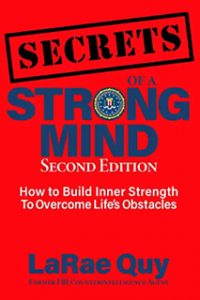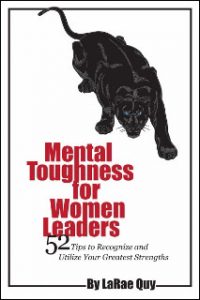I learned how to become mentally tough after I failed the interim physical fitness test at the FBI Academy. With this failure came the understanding that I was not so great after all and that I stood a good chance of being washed out.
I became obsessed with improving my fitness scores. My focus narrowed down to the next day’s training. I dug deep to uncover why I wanted to become an FBI agent. Drilling down on these sets of values propelled me over the next couple of months and I did eventually pass the fitness test.
As business owners and entrepreneurs, you also face hard challenges. It might be the marketplace, nervous investors, or aggressive competition, but you will need to be mentally tough if you plan to focus your thinking and move through those challenges successfully.
It’s hard to feel mentally tough when you’re stuck. You need the grit to welcome challenges as obstacles to overcome.
Here are 7 things mentally tough people refuse to think:
1. Struggle Has No Meaning
To my horror, many of my FBI colleagues relished the new challenges presented each day at the Academy. I thought they were crazy—they actually volunteered to experience pain and discomfort! What normal person does that?
I learned that mentally tough people often voluntarily choose the hard path, the road less traveled. They will go out of their way to experience failure so they can turn their focus into looking for ways to turn obstacles into opportunities.
It takes confidence to look failure in the face and keep moving forward, because if we are confident in ourselves and our ability, we look at our struggle as part of the fine-tuning process.
TIP: People become mentally tough when they give their struggle the finger, and instead, focus on improvement and growth.
2. Winning Is Everything
When people ask me to talk about my biggest failure, I talk about the pain of failing the interim physical fitness test. It was a failure that cut to the core, but it also inspired a remarkable amount of personal growth. I learned more from that single failure than from any of my successes.
Most of us fear failure so much that we shuffle along in life until we accidentally stumble onto something at which we are good. Success can be very misleading because often it is not what really fuels us. It is a success that is based in complacency because we are too scared of failure to pursue the type of work that would provide value and meaning.
TIP: Mentally tough people recognize that the way in which they deal with failure determines how they will achieve success.
3. Pain Is To Be Avoided
Sports psychologist Tim Woodman has done a lot of studies on what makes superior athletes. He spent time interviewing many top performers and the one thing that he came away with was this: nearly every top performer in his study had experienced a critical negative event in their life—parents divorcing, a death, disease, or some other perceived loss—and they experienced it early in life.
Mentally tough people learn early that life is hard, pain is inevitable, and growth is optional. They find ways to turn shit into sugar.
Pain is nature’s way of getting our attention. Mentally tough people do not coddle themselves or avoid situations where there are problems to solve and the pain that comes with them. Some of our best insights are at the tail end of our worst moments. Pain often forces us to look at our values and beliefs and question why they might be failing us.
Weak people try to cover up the pain and delude themselves rather than intelligently looking for way to produce real change.
Don’t hope for a life with no pain; hope for a life with good pain. We all know that not everything that feels good is actually good. In the same way, not everything that feels painful is necessarily bad.
TIP: Once you forget about the pain, you become unstoppable.
4. Focus Only On The Positive
Positive thinking is a cornerstone of mental toughness. Research has proven the real benefits of staying positive, especially in adverse situations. Unfortunately, many people today only focus on the positive and refuse to acknowledge the negative in their life. Used in this manner, positive thinking becomes little more than a bandaid trying to cover a cancerous lesion.
Reminding yourself of what could go wrong is not pessimism. It’s being smart. You will encounter rude bosses, conniving colleagues, and unruly customers. Why not prepare for them?
FBI agents do not prepare for arrests by assuming everything will turn out OK. They prepare for arrests by anticipating all that could go wrong.
Mentally tough people are less likely to get frustrated and blow a deal or lose control during a tense negotiation. The reason is because they do not focus only on the positive. They imagine every conceivable setback and obstacle that could materialize; they find ways to cope and overcome the adversity before it becomes a reality.
Cognitive Behavioral Therapy suggests spending time thinking about the potential downside of a conversation or event in advance can help you avoid an “oh shit” moment.
How To Make It Work For You: Take the time to think through the worst that could happen and allow yourself to feel the negative stuff. When you do, you’ll be able to manage the unproductive drama that these emotions can produce.
5. Suppress Emotions
In our current feel-good self-improvement culture, we’re encouraged to only acknowledge positive emotions and feelings. Shove down the negative stuff and pretend it doesn’t exist. All that is fine until you have a negative emotion that won’t be silenced, and I’m betting all of you have been there before.
It’s stupid to pretend everything is fine and that you don’t experience negative, even humiliating, emotions. What is smart is to use neuroscience to figure out what to do with them so they don’t sabotage your best efforts to move forward.
How To Make It Work For You:
- Nip negative thoughts and emotions in the bud when they first appear and are at their weakness.
- Label each emotion for what it truly is, not just what sounds good to you.
- Call out the emotion by name: shame, envy, anger, jealousy, lust, etc.
- Describe the emotion in 1 or 2 words; be succinct and to the point.
- Do not enter a dialogue about the emotion; anything more than 1 or 2 words will only give it legs with which to run wild.
- Resist attempts to justify the emotion. Notice it and move on.
6. Stick To What Feels Comfortable
If our coaches at the FBI Academy weren’t pushing us into our discomfort zone, they weren’t doing their job. After I realized I hadn’t joined an organized group of sadists, I understood that the coaches moved us into our discomfort zones so we’d be better able to cope with the trials that lie ahead of us as FBI Agents.
If success and comfort is all you’ve ever known, you will not be prepared for the shitstorm that will come at some point in your life. Whether it’s your career, your health, old age, or something unseen, if you are mentally tough you know you will be able to endure the discomfort.
Mentally tough people embrace discomfort zones because they have learned that unpleasant experiences are not something to fear. In the process, they’ve learned the survival skills that will take them to the next level.
How To Make It Work For You: Don’t throw yourself into unproductive things, but do seek out experiences that will move you into the unknown so you know how you will respond when confronted with adversity.
7. Others Are To Blame
One of the most important lessons learned in childhood is that you don’t always get to play with the red ball in the playground. This early lesson illustrates how you deal with failure, struggle, and loss. You can whine, point fingers, and blame others but ultimately you must choose how you deal with not always getting what you want.
Victimhood has become very popular. It’s now possible to be offended and insulted for just about anything. It feels self-righteous to cast ourselves as a victim, but as cartooonist Tim Kreider points out, outrage is one of those things that will eventually devour us from the inside out.
TIP: Grit-up and be mature enough to take responsibility for your actions. There are enough real victims in the world. If you want to be authentically outraged, help one of them.
© 2018 LaRae Quy. All rights reserved.
You can follow me on Twitter, Facebook, Instagram, AND LinkedIn
Are you mentally tough? Here is my FREE Mental Toughness Assessment
Get my new book, “Secrets of a Strong Mind (second edition): How To Build Inner Strength To Overcome Life’s Obstacles”
Author of “Mental Toughness for Women Leaders: 52 Tips To Recognize and Utilize Your Greatest Strengths”







I’ve been running into victimhood left and right lately. I was working with someone who even when they were told that they were doing the right thing, pointed out three others who they thought were doing the wrong thing and deserved less credit. Are you kidding me? It didn’t land well in the moment but I’m hopeful that it will sink in overtime when I said, “You will not get far in life if everyone else is always to blame. Always looking for a scapegoat has got to stop.” Harsh words absolutely said with love.
Another fantastic piece from you, LaRae. Will share!
Alli
I found this to be really intriguing. I can say I absolutely love six of these, but one of these I have a slight problem with… sometimes.
It’s your #3, about pain. Describing it the way you did makes a lot of sense. However, many people apply it to physical pain, and that’s where I sometimes draw the line. There’s a motivational speaker named Eric Thomas who tells people that pain is temporary… when it’s really not. There are things I did in my teens to my body, trying to be the best and hopefully dominate people, that still give me pain 40 years later. At the time it felt like it was worth it but in retrospect is wasn’t; it was meaningless. I think about all the football players walking around with CTE who probably wish they’d listened to their bodies more than those advocates who told them to play through pain.
So I have mixed emotions about that one. Mental pain as it applies to making decisions and solving issues definitely needs to be worked through. Physical pain… maybe not so much all the time.
HI Mitch…great to hear from you! I totally agree with you about the reality of physical pain. Pain is real and something to be recognized. The pain that I’m referring to is more about the mental pain that we experience when confronted with the unpleasant things in life. Life is hard. Pain is inevitable. Growth is optional. The real key here is to learn something from the pain you are experiencing rather than pretending it doesn’t exist.